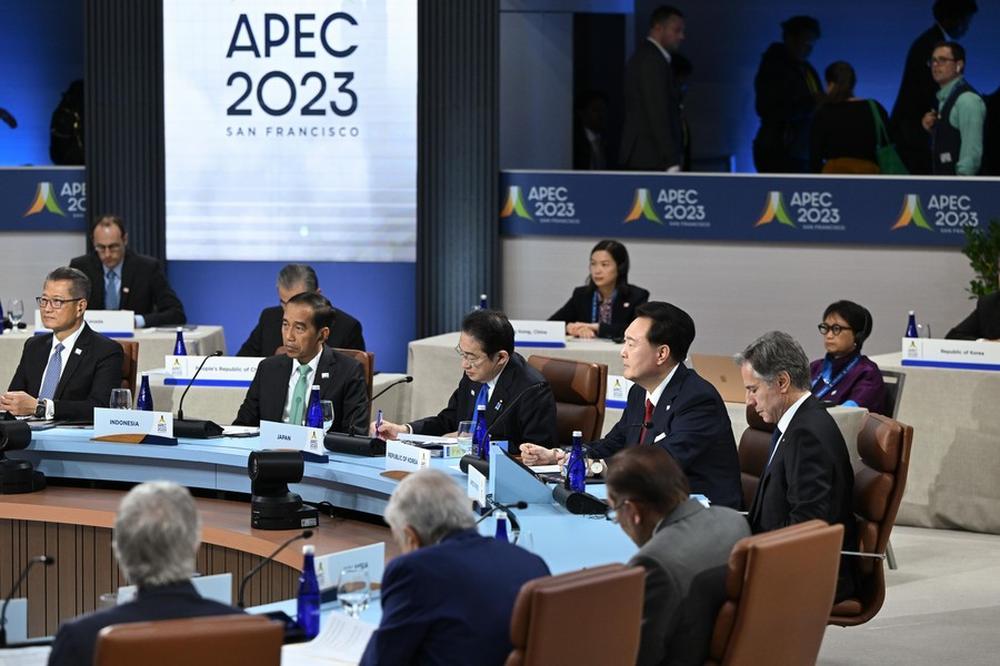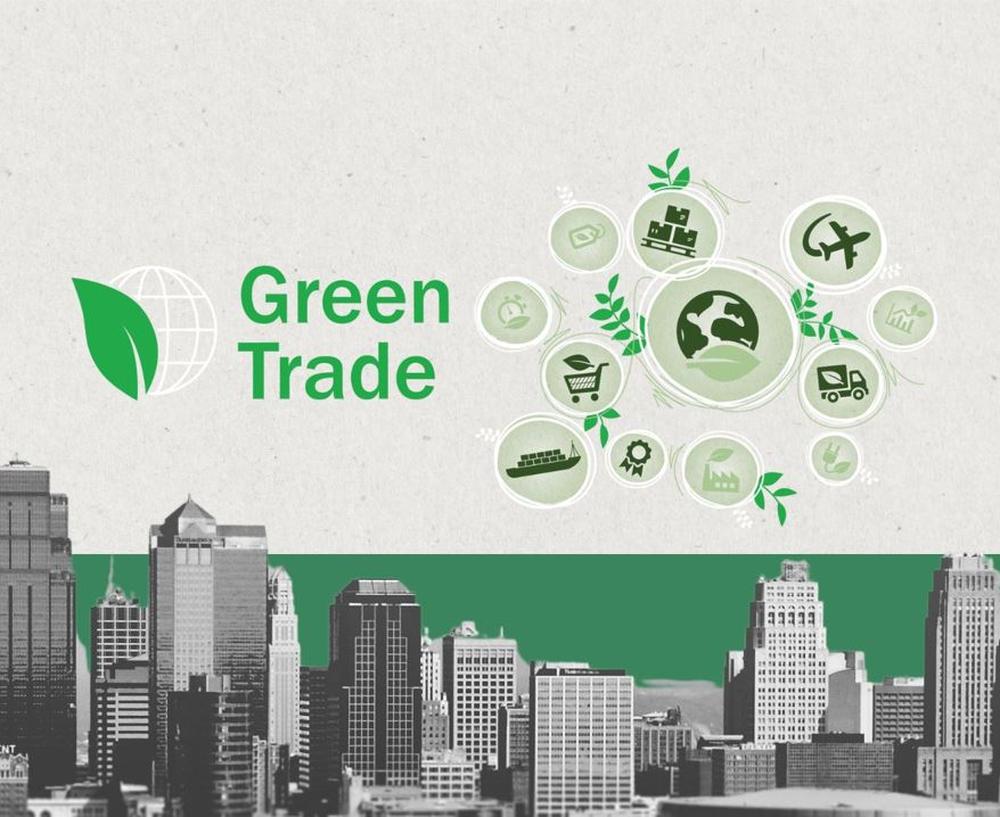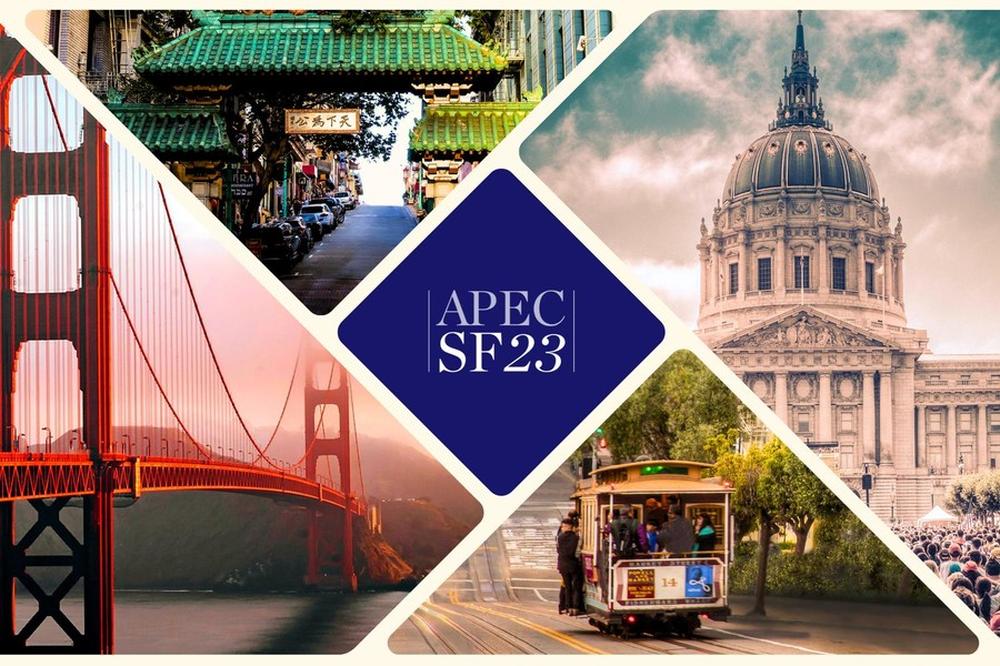- #China
- #Economy & Trade
- #Global Issues
- #US Foreign Policy

► It is evident that the US’ domestic political uncertainty has constrained both APEC and IPEF development. Foreign policy and trade are not on the US government’s list of priorities, especially with next year's upcoming presidential election.
► Three APEC member economies: Viet Nam, Indonesia and Mexico are among “the connector” of a fragmented global economy by avoiding being trapped in the strategic competition between the US and China and diversifying to reduce the supply chain risks.
► Peru will host APEC in 2024, coinciding with commemorating the 30-year Bogor Goals and reaffirming APEC's grand vision in trade should be the utmost priority.
Asia-Pacific has become the most dynamic and economically vibrant region and is poised to remain the forefront leader in global trade. APEC member economies collectively accounted for almost 50% of the world trade last year. However, the prospects seem bleak mostly due to the rising geopolitical and geoeconomic tensions. Three out of five top economic risks in the APEC region are related to global trade uncertainty such as geoeconomic fragmentation, world trade growth slowdown and protectionism trends.[1] Two other notable challenges are high inflation and climate risks. Hence, as a premiere platform in economic cooperation, APEC should set the standard for establishing a more resilient, sustainable and inclusive global trade policy framework that is crucial in today’s economy.
Two landmark agreements, Bogor Goals in 1994 and followed by APEC Putrajaya Vision 2040, emphasize APEC member economies' grand vision to have a free, open, fair, non-discriminatory, transparent and predictable trade and investment environment.[2] Although non-binding in nature, APEC champions open regionalism and has proven to be a useful platform in sandboxing innovative policy frameworks and ideas incubator on contentious international trade issues. Some APEC-led initiatives, such as Information Technology Agreement (ITA) and the List of Environmental Goods, have accelerated trade cooperation on technology and environment nexus and have been elevated and discussed in the World Trade Organization (WTO). Well-equipped with a robust multistakeholder engagement such as the APEC Business Advisory Council (ABAC) and the Pacific Economic Cooperation Council (PECC), APEC should aim for an innovative and ambitious trade agenda, especially in reviving trust and effectiveness in economic cooperation.
Under the theme “Creating a Resilient and Sustainable Future for All,” the US hosted the APEC member economies leaders in the City of San Francisco from 11th to 17th November this year. Considered one of the long-term goals of APEC on the trade agenda, the Free Trade Area of the Asia-Pacific (FTAAP), was not on the menu. As a group where the members consist of the US, China and Russia as the center of today’s geopolitical dynamics, it is reasonable to have a low expectation of the APEC Summit this year, especially hoping for significant progress on the trade agenda. The ongoing crisis in Russia-Ukraine, the South China Sea and the Israel-Palestine conflict further dampen the likelihood of achieving consensus. The highly anticipated Biden-Xi Meeting proved to be quite productive in showing that there is still a shared interest in addressing climate change and managing healthy competition while preventing possible confrontation between two major powers. This includes the infamous Panda Diplomacy. [3] Nevertheless, there is no guarantee that the meeting will alleviate the prolonged economic tensions ranging from trade and investment, semiconductors and critical minerals such as export controls, subsidy races and investment screening between two countries.
The 2023 APEC Leaders’ Golden Gate Declaration has been released, highlighting a notable deliverable: the San Francisco Principles on Integrating Inclusivity and Sustainability into Trade and Investment Policy, initially met with objection from China.[4][5] The principles aim to ensure that trade and investment policy in APEC member countries align with environment sustainability and inclusivity, more robust transparency, and better data management.[6] Moreover, the principles should be seen as essential steps to avoid harmful inward-looking trade and investment policies amid the rising concern of “green protectionism” and to achieve more coordination and cooperation based on shared interest in greening trade and investment. Among other notable outcomes are the Non-Binding Just Energy Transition Principles, Principles for Achieving Food Security Through Sustainable Agri-Food Systems and the updated Disaster Risk Reduction Framework and Action Plan.
This year's most awaited trade agenda during APEC is the conclusion of the Indo-Pacific Economic Framework (IPEF). Since the US is not a member of any mega-trade agreements such as CP-TPP or RCEP, the framework is seen as the US’ effort to return to the Indo-Pacific region and improve its presence and economic engagement. More importantly, the IPEF is not a trade agreement since it does not include market access and without China in the negotiation. Launched in May 2022, the IPEF consists of four pillars: trade, supply chains, climate, and anti-corruption. Some experts see IPEF as a positive gesture from the US, while others question its effectiveness in putting the US back on the Indo-Pacific region map. The IPEF meeting in San Fransisco has been concluded but leaving the trade pillar to have more rounds of talks in the future since it contains sensitive issues such as labor and environment standards.[7] In addition, it also covers digital trade, which has also been controversial since the US’ policy reversal on e-commerce proposal at the WTO negotiations last October.[8] This decision sparks questions about the US’ leadership in the digital economy and data governance. In other words, it is evident that the US’ domestic political uncertainty has constrained both APEC and IPEF development. Foreign policy and trade are not on the US government’s list of priorities, especially with next year's upcoming presidential election. Even former President Trump's mentioned an idea to increase import tariffs by 10% for all US-imported products if re-elected.[9] Therefore, countries must be cautious about domestic political changes that might alter the US’ foreign economic policy direction in near future.
Apart from the US’ inward-looking foreign policy, it should be noted that there has been a significant changing landscape in trade patterns over the last 30 years. Due to surging trade, most APEC member economies become more dependent on China.[10] For example, the China's share of manufactured imports from Viet Nam and Indonesia has doubled from 30% and 22% in 2010 to 43% and 42% in 2021, respectively. In the current escalating geopolitical tensions and the decoupling (or derisking) trend between the United States and China, countries have the opportunity to reap the benefit from the restructuring of the global supply chain. Three APEC member economies: Viet Nam, Indonesia and Mexico are among “the connector” of a fragmented global economy by avoiding being trapped in the strategic competition between the US and China and diversifying to reduce the supply chain risks.[11] Hence, the best strategy is to utilize economic cooperations, like APEC and IPEF, in reforming trade policies, transforming trade facilitation and improving logistical performance. Moreover, it is also crucial in ensuring policy framework and standard alignment among countries regarding the environment, labor, and transparency.
What is next for APEC next year? Peru will host APEC in 2024, coinciding with commemorating the 30-year Bogor Goals and reaffirming APEC's grand vision in trade should be the utmost priority. Given the persistence of global trade uncertainty, APEC must keep the trade open by focusing on monitoring and surveillance including trade, investment and industrial policy to reduce supply chain disruption risk. Moreover, accelerating the paperless cross-border trade facilitation work among member economies can be a quick-win agenda. Substantial progress is also needed to support the WTO Reform especially in achieving a fully working Dispute Settlement Boady (DSB) to guardrail the increasing trade tensions. Peru should also leverage CP-TPP to advance a concrete and more ambitious trade agenda as a building block of FTAAP discussion next year. Lastly, APEC should consider expanding the membership to other countries, for example India, to maintain its open and inclusive principles.
[1] According to the 2023-2024 State of the Region report by the Pacific Economic Cooperation Council (PECC)
[2] https://www.apec.org/meeting-papers/leaders-declarations/2020/2020_aelm/annex-a
[3] https://www.whitehouse.gov/briefing-room/statements-releases/2023/11/15/readout-of-president-joe-bidens-meeting-with-president-xi-jinping-of-the-peoples-republic-of-china-2/
[4] https://www.apec.org/meeting-papers/leaders-declarations/2023/2023-leaders-declaration
[5] https://www.reuters.com/world/china-objects-us-proposal-apec-trade-investment-policies-source-2023-11-15/
[6] https://www.apec.org/meeting-papers/leaders-declarations/2023/2023-leaders-declaration/san-francisco-principles-on-integrating-inclusivity-and-sustainability-into-trade-and-investment-policy
[7] https://asia.nikkei.com/Politics/International-relations/Indo-Pacific/IPEF-struggles-to-deliver-trade-benefits-as-U.S.-looks-inward
[8] https://asia.nikkei.com/Politics/International-relations/Indo-Pacific/U.S.-looks-to-postpone-IPEF-talks-on-digital-trade-rules
[9] https://www.economist.com/finance-and-economics/2023/10/31/donald-trumps-second-term-would-be-a-protectionist-nightmare
[10] https://www.piie.com/research/piie-charts/most-ipef-members-became-more-dependent-china-trade-over-last-decade
[11] https://www.bloomberg.com/news/articles/2023-11-02/vietnam-poland-mexico-morocco-benefit-from-us-china-tensions?cmpid=BBD110223_TRADE&utm_medium=email&utm_source=newsletter&utm_term=231102&utm_campaign=trade&embedded-checkout=true
Dandy Rafitrandi is a researcher at the Department of Economics, Centre for Strategic and International Studies (CSIS), Indonesia. He is also a project director at the Decarbonization for Development Lab (DfD Lab) and responsible as an editor-in-chief at CSIS Indonesia. Additionally, he served as an adjunct Faculty Member at Universitas Prasetiya Mulya.


